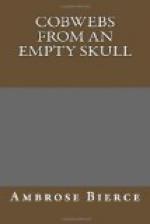Frau Gaubenslosher was strongly suspected of witchcraft. I don’t think she was a witch, but would not like to swear she was not, in a court of law, unless a good deal depended upon my testimony, and I had been properly suborned beforehand. A great many persons accused of witchcraft have themselves stoutly disbelieved the charge, until, when subjected to shooting with a silver bullet or boiling in oil, they have found themselves unable to endure the test. And it must be confessed appearances were against the Frau. In the first place, she lived quite alone in a forest, and had no visiting list. This was suspicious. Secondly—and it was thus, mainly, that she had acquired her evil repute—all the barn-yard fowls in the vicinity seemed to bear her the most uncompromising ill-will. Whenever she passed a flock of hens, or ducks, or turkeys, or geese, one of them, with dropped wings, extended neck, and open bill, would start in hot pursuit. Sometimes the whole flock would join in for a few moments with shrill clamour; but there would always be one fleeter and more determined than the rest, and that one would keep up the chase with unflagging zeal clean out of sight.
Upon these occasions the dame’s fright was painful to behold. She would not scream—her organs of screech seemed to have lost their power—nor, as a rule, would she curse; she would just address herself to silent prayerful speed, with every symptom of abject terror!
The Frau’s explanation of this unnatural persecution was singularly weak. Upon a certain night long ago, said she, a poor bedraggled and attenuated gander had applied at her door for relief. He stated in piteous accents that he had eaten nothing for months but tin-tacks and an occasional beer-bottle; and he had not roosted under cover for so long a time he did not know what it was like. Would she give him a place on her fender, and fetch out six or eight cold pies to amuse him while she was preparing his supper? To this plea she turned a deaf ear, and he went away. He came again the next night, however, bringing a written certificate from a clergyman that his case was a deserving one. She would not aid him, and he departed. The night after he presented himself again, with a paper signed by the relieving officer of the parish, stating that the necessity for help was most urgent.
By this time the Frau’s good-nature was quite exhausted: she slew him, dressed him, put him in a pot, and boiled him. She kept him boiling for three or four days, but she did not eat him because her teeth were just like anybody’s teeth—no weaker, perhaps, but certainly no stronger nor sharper. So she fed him to a threshing machine of her acquaintance, which managed to masticate some of the more modern portions, but was hopelessly wrecked upon the neck. From that time the poor beldame had lived under the ban of a great curse. Hens took after her as naturally as after the soaring beetle; geese pursued her as if she were a fleeting tadpole; ducks, turkeys, and guinea fowl camped upon her trail with tireless pertinacity.




